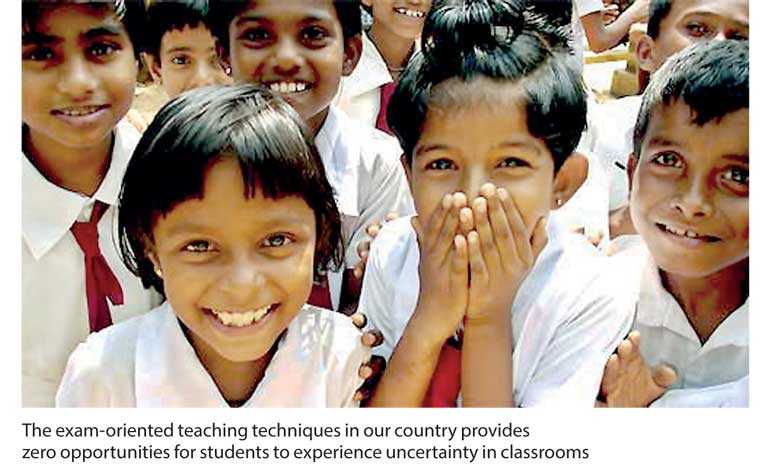Friday Feb 27, 2026
Friday Feb 27, 2026
Wednesday, 1 August 2018 00:00 - - {{hitsCtrl.values.hits}}

 When perusing the prevailing dynamics of the Sri Lankan education system, I have observed that uncertainty is commonly considered antithetical to the objectives of education. Teachers and students intend to make learning rapid, convenient and free from ambiguity.
When perusing the prevailing dynamics of the Sri Lankan education system, I have observed that uncertainty is commonly considered antithetical to the objectives of education. Teachers and students intend to make learning rapid, convenient and free from ambiguity.
The exam-oriented teaching techniques in our country provides zero opportunities for students to experience uncertainty in classrooms. This approach is propelling students to memorise the syllabus where he or she could predict the exam questions, which ultimately hinders their thinking capabilities to handle turbulent situations.
Overview
What would be the outcome if we invited uncertainty into our classrooms and are we ready to do so? This question remains challenging because we detest uncertainty. It’s uncomfortable. In typical classrooms, lecturers frequently replace uncertainty with over-planned learning experiences. The lecturers would define the issues the students will solve, how they should solve them and would even shed light on the desired outcomes.
These types of learning experiences do not expose students to engage with uncertainty. It is a need of the hour to inject minute doses of uncertainty into classroom lessons daily as it engages students at the “analysis and above levels”. This would force the students to analyse what they know and what they don’t and to arrive at a decision about what needs to be done.
Error-facilitated learning
When students are inquired, students generate answers, concepts, ideas, etc. During the process, students are apt to make mistakes. When they are engrossed in uncertainty due to their incorrect answers, they are better seasoned to effectively encode and remember the accurate information.
Accommodating for confusion allows students to disrupt their beliefs whilst creating new paradigms of thinking which would be difficult to inculcate otherwise.
Accepting uncertainty
as an opportunity
A strong belief amongst many local and private institutes in Sri Lanka is that uncertainty fuels curricular chaos. As a result, the teachers are justified in attempting to eliminate it.
A sure-fire approach to iron out this resistance towards uncertainty, is through injecting ‘positive uncertainty’ into classroom sessions by providing opportunities for students to engage with the unknowns of a challenge in a well-structured environment.
For example, when students initiate their own methods of solving a given problem, teachers can inform in advance about key limitations, the key expectations of the problem and how additional assistance could be obtained if needed.
Although it is not clear during this phase as to how best the problem could be solved, students would still receive the direction to steer the doubts and confusions associated with the problem in an attempt to solve it on their own yet surrounded by ambiguity.
Focus on the ‘why’
Asking ‘why’ questions directly pilot students to move away from merely reading questions, which in most of the cases require to repeat back facts or summarised answers from the text. Much more holistically, ‘why’ questions can yield and spur dynamic thinking and critical discussions.
As uncertainty is an integral element of the ‘why’ question, this approach encourages students to engage in deeper and abstract thinking whilst submerging them to tackle turmoil.
The way forward
As Sri Lanka enters an extremely competitive international environment with a strategic intent of transforming the country into a modern economy, producing a well-rounded workforce embedded with market oriented skills is of paramount importance.
Sri Lankan students should be placed in a state of limbo with their beliefs whilst assisting them to fester in the uncertainty of their knowledge. This approach facilitates a journey towards better learning and to the breeding of strategic thinkers.
We need to ask ourselves: Have we socialised our students into the belief that uncertainty is bad? If so, our future workforce would avoid taking risks and struggle in handling turbulence.
(The writer possesses over four years of lecturing experience for professional as well as academic qualifications affiliated with several local and foreign institutes. He is a MBA holder from the Postgraduate Institute of Management – University of Sri Jayewardenepura.)